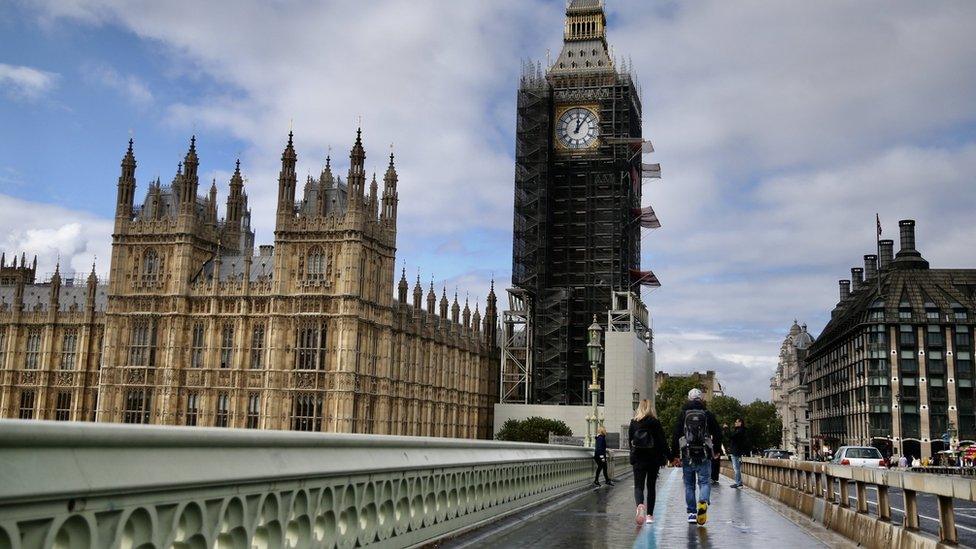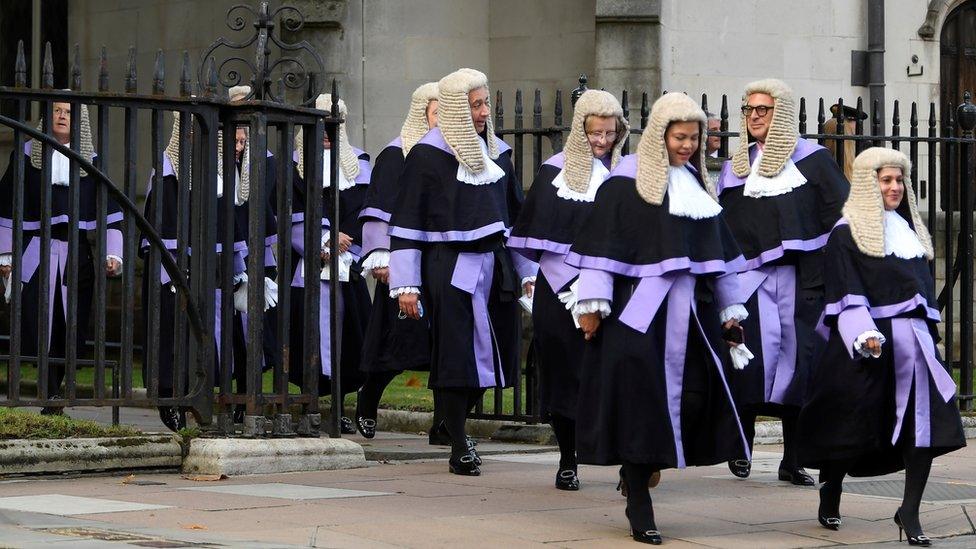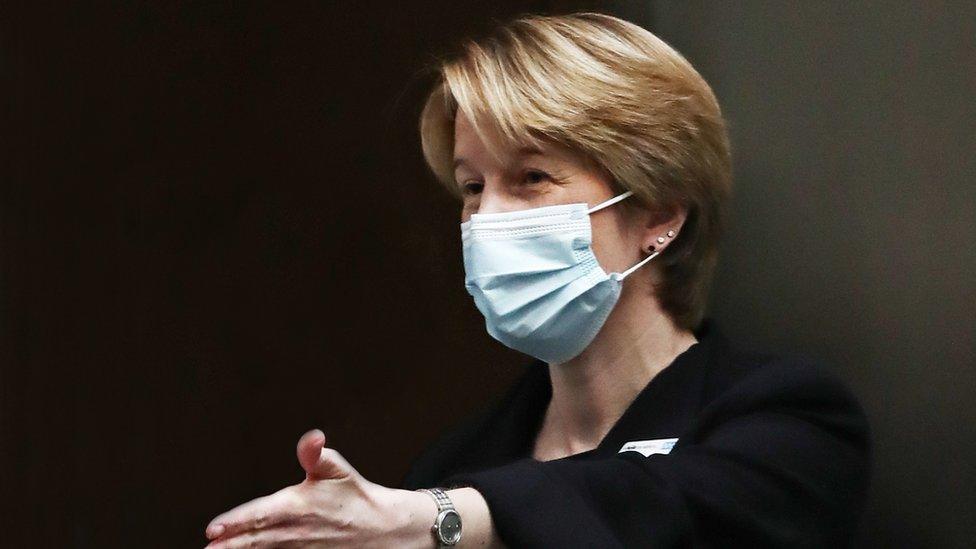The week ahead in Parliament
- Published

MPs return to Westminster this week, as the party conference season draws to a close
Parliament resumes on Monday under the shadow of the murder of one of its own.
There will be formal tributes to Sir David Amess and discussions about how MPs might better protect themselves, but they all know they can't represent the voters effectively if they're insulated from them, if there's a hulking bodyguard standing behind them, or a sentry at the office entrance.
This blog was compiled before Friday's events - and it is not clear how the schedule described below will be reorganised. But everyone in Westminster understands how vital it is that Parliament pays its respects and expresses its collective grief.
There will doubtless be the usual crop of government statements and urgent questions about developments over the recess, and the aftershocks of the joint health and science committees' report on the handling of the pandemic will run through the week - not least in Tuesday's debate on the renewal of the Coronavirus Act.
With the COP 26 climate conference looming, ministers face some awkward decisions about whether to accept or reject a series of Lords amendments to the Environment Bill (see below), with the risk of damaging their own green credentials in the midst of the international negotiations.
Expect plenty of questions about this month's Spending Review - or rather bids for funding in the guise of questions - to be a regular feature of the next couple of weeks, as with Labour peer Lord Cashman's question on HIV funding on Tuesday.
And the week ends with a brace of controversial private members' bills, one each in the Commons and the Lords. Here's my rundown of the week ahead.
Monday 18 October
The Commons reconvenes (14:30 BST) for Home Office Questions, doubtless to be followed by some post-recess updates from ministers, and maybe some urgent questions.
The main legislative action is the second reading of the Judicial Review and Courts Bill, a major measure that makes a variety of important changes to the operation of the justice system.
These include abolishing so-called "Cart" judicial reviews, which the government argues have little chance of success, but delay the removal of people with no right to be in the UK.
Westminster Hall stages two 90-minute debates on petitions: the first (16:30) urging more funding for research into endometriosis and polycystic ovary syndrome, and the second calling for the phasing out of animal experiments.

Government plans to scale back judicial reviews have prompted an outcry from some campaign groups
On the committee corridor, Public Accounts (16:00) looks at the working of the Environmental Land Management Scheme - the new framework for farming subsidies which seeks to promote sustainable farming, local nature recovery and landscape recovery.
In the Lords (14:30), question time covers creating a new ministerial post to oversee relations with the devolved authorities, and on funding for an HIV action plan in this month's Spending Review.
Then it's on to day two of report stage consideration of the Skills and Post-16 Education Bill - the government was defeated three times on day one. Watch out for government amendments to make it a criminal offence to sell essay-writing services to students.
Tuesday 19 October
Commons business opens (11:30) with health and social care questions, possibly followed by more post-recess statements or urgent questions.
The day's ten-minute rule bill, from Labour MP Sarah Owen, is on Bereavement Leave and Pay offered to couples after stillborn and miscarried babies.
She is a vice-chair of the all-party group on baby loss and has spoken in the Commons about her own miscarriage. She believes time off for physical recovery and time to grieve was crucial to her.
Covid powers renewal
Then comes the motion to renewal the temporary provisions of the Coronavirus Act. This is the third six-monthly vote to renew temporary powers like the ability to close ports or dispose of dead bodies, but some of the most controversial, for example on banning gatherings or detaining infectious people, won't be put up for renewal by the government.
The way the system is configured means MPs have to vote for or against a motion with wording specified in the original Act - so they can only accept or reject the entire menu of powers ministers wish to renew - they can't amend the list to take something out.
There's been some chatter that lockdown-sceptic Conservatives might defy the government whip on this vote, but now some of the most criticised powers are not to be renewed, that looks unlikely. I'm told that if the renewal motion is pushed to a vote, MPs sceptical about the powers would abstain rather than vote against.
But expect critical speeches, and longer-term calls for Parliament to rethink the way emergency powers are handled.
The rest of the day is devoted to a Labour opposition day debate.
Committee action includes Health and Social Care (09:45) quizzing the new head of NHS England, Amanda Pritchard, on clearing the backlog of treatments and medical procedures left by the pandemic. This will be her debut before the committee, after taking over from Sir Simon Stevens in August.
The questioning will focus on to whether there will be sufficient funding to tackle the backlog, and how much of the new health and care levy the NHS would expect to receive. Workforce pressures, support for mental health services, and the challenges of a winter flu season will also crop up.

Amanda Pritchard has a very full in-tray after taking over as head of NHS England over the summer
In the Lords (14:30) ministers field questions on telephone versus in-person appointments with GPs, and child poverty.
Then, there's the second reading of the not-very-controversial Compensation (London Capital & Finance plc and Fraud Compensation Fund) Bill, which will be frogmarched through all stages on consideration in a single go, and still leave time for report stage consideration of the Telecommunications (Security) Bill, followed by report stage of the Telecommunications (Security) Bill.
There will also be a short debate on the 2015 nuclear deal with Iran, and the detention of dual nationals there.
Wednesday 20 October
The Commons day begins (11:30) with half an hour of questions to Alok Sharma, the president of the COP 26 climate summit, followed at noon by Prime Minister's Questions.
The Green Party's Caroline Lucas will then outline her ten-minute rule bill, which proposes a ten-year economic and public investment strategy for transitioning to low-and zero-carbon industry.
The day's green theme continues into the afternoon, when MPs consider Lords amendments to the Environment Bill. There are 95 proposed changes, but there will be a particular focus on the dozen issues on which the government has been defeated.
These include new requirements for declaring a climate and biodiversity emergency, soil health, air quality, the powers and independence of the new Office for Environmental Protection, protecting pollinating insects, reducing sewage discharges into rivers, and preventing deforestation.
How many of those amendments will the government seek to remove, or offer alternatives to?

The UK's green credentials are under the spotlight ahead of the COP26 summit in Glasgow
Committee action includes Work and Pensions (09:30) with a panel of witnesses from Citizens Advice, the Children's Society and a series of local councils, about children whose parents do not have access to the benefits system, and Home Affairs (10:00) looking at the investigation and prosecution of rape, with a series of heavyweight police and legal figures.
In the Lords (15:00), question time ranges across ensuring gambling operators provide high-quality and accurate data to the Gambling Commission.
The main action is the first of (count them) seven days of committee consideration of the mammoth Police, Crime, Sentencing and Courts Bill.
This is the preliminary sparring stage, where amendments are honed and issues explored, but where actual votes are rare.
However, discussion at this stage often tees up serious attempts to rewrite the Bill at the following report stage. And this is precisely the kind of bill where the serried ranks of retired judges and superlawyers in the Lords will weigh in.
Thursday 21 October
The Commons opens (09.30) with questions to the new International Trade Secretary, Anne-Marie Trevelyan, who returned to the cabinet last month after being International Development Secretary when the department was abolished.
After this, the Leader of the House will announce the coming week's Commons agenda.
Then Caroline Lucas leads a backbench debate on COP26 and limiting global temperature rises to 1.5 degrees Celsius. (Slightly oddly, the Backbench Business Committee has also scheduled a debate on the Committee on Climate Change's 2021 progress report on the UK's performance at 13:30 - which looks like a bit of a clash.)
That is followed by a debate on World Menopause Month - this is led by Labour's Carolyn Harris, whose Menopause (Support and Services) private member's bill is due for its second reading debate on 29 October.
Brexit argy-bargy
The adjournment debate, led by Labour's Abena Oppong-Asare, is on Black History Month.
In the Lords (11:00), ministers field questions on the next meetings between the prime minister and the first ministers of the UK's devolved governments, from former first minister of Scotland, Lord McConnell of Glenscorrodale, and support for people at high risk of developing type 2 diabetes who have gained weight during the pandemic.
And there's also a special half-hour question time for the government's Brexit supremo, Lord Frost, a minister at the Cabinet Office, where I imagine the continuing argy-bargy over the Northern Ireland Protocol will feature.
The main debates are on subjects chosen by backbench Conservative peers. First, former armed forces minister Lord Lancaster, on the threats confronting the UK and its allies, then former energy secretary Lord Howell leads a debate on civil nuclear power.
There's also a short topical question from Lib Dem peer Lord Tyler on the integrity of electoral processes.
Friday 22 October
MPs meet at 09:30 to debate the next helping of private members' bills.
These are bills proposed by individual MPs, and the rules for debating them make it very hard for anything controversial to get through, because determined opponents can simply keep talking (so long as they stick to the rules of debate and avoid hesitation, deviation or repetition) until the available time runs out, thereby preventing the bill being put to a vote.
The only way this can be quashed is if more than a hundred MPs vote for a motion "that the question be now put" - in which case, if the motion is won, the House then moves to a vote on the bill.
I mention this because, unlike the first set of private members' bills debated in September, this Friday's include the second reading of the Employment and Trade Union Rights (Dismissal and Re-engagement) Bill from the senior Labour MP Barry Gardiner.
This aims to outlaw "fire and re-hire" tactics used by employers to drive down pay and conditions . A measure of the government opposition to this measure is that Conservative MPs are on a three-line whip, presumably in order to defeat any closure motion.

There have been a wave of strikes in recent months over "fire and rehire" tactics
Keep an eye out too for the second bill on the agenda, the Local Government (Disqualification) Bill, proposed by wily Tory ex-minister Sir Paul Beresford.
This would close a loophole in the disqualification rules for local councillors, so that councillors convicted of a child pornography offence, but not jailed, would be disqualified from office.
If Mr Gardiner's bill is debated for most of the morning, there might not be time for a second reading debate on this measure - but I understand Sir Paul has been trying to get agreement for an unopposed formal second reading.
His bill would be sent forward for detailed scrutiny if no one shouted "object" when its title is read out at the close of business at 14:30. But to do that, he will need to persuade those MPs who object in principle to the idea of bills being given a second reading without debate. Watch this space.
There are plenty of other bills on the order paper, on corporate homicide and energy pricing, for example. But given that Mr Gardiner's bill looks set to soak up all the available debating time, they're unlikely to be considered.
The Lords (10.00) is also considering private members' bills - in this case, it's the second reading of the Crossbencher Baroness Meacher's Assisted Dying Bill.
This is the latest in a long line of assisted dying bills put before the Lords, including by Lord Falconer, and Lord Joffe before him.
They always produce interesting debate, but the problem with Lords private members' bills is that they have no priority for debate in the Commons, so they just join a long queue of ten-minute rule bills, presentation bills and other legislative flotsam and jetsam, never to be heard of again.
At the time of writing, 126 peers have put down to speak in the debate, which suggests they will have about two minutes apiece to ponder the issues of death and choice.
